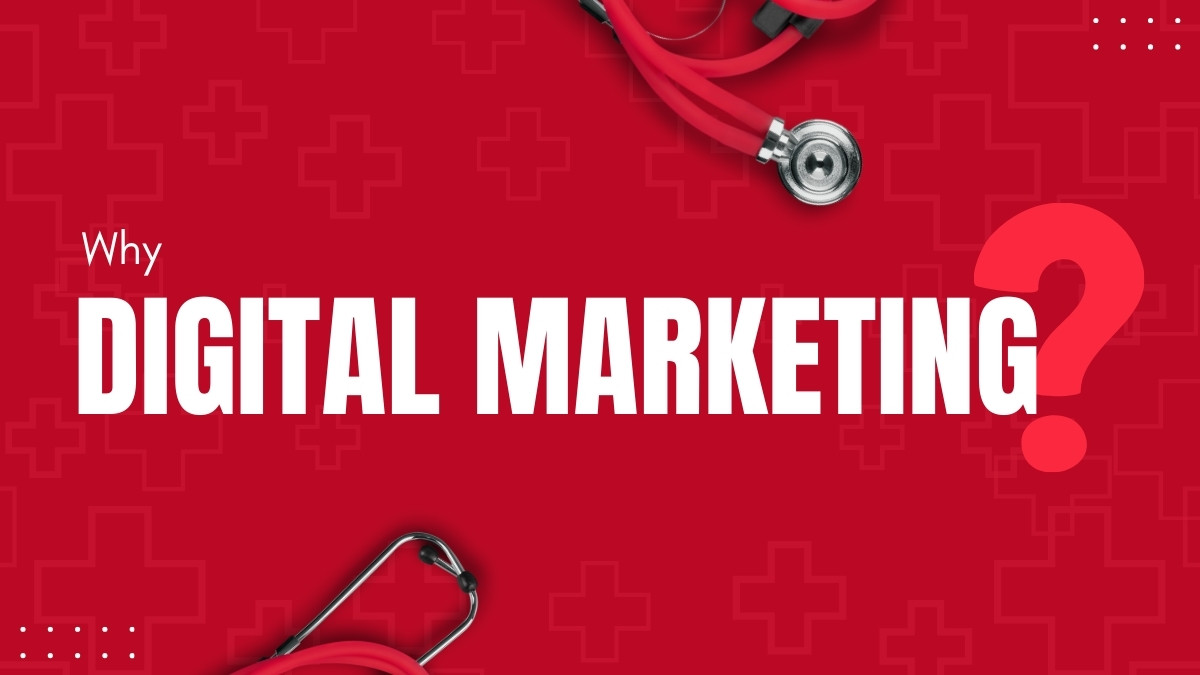
Digital Marketing for Doctors
You’re an expert at caring for patients, but you might feel less confident when it comes to marketing your practice. You likely didn't learn about SEO or social media in medical school. However, in our connected world, having an online presence is no longer optional—it's essential for a thriving medical practice.
Digital marketing is simply about connecting with your patients online. It's how new patients find you and how you build a trusted reputation in your community. This guide will walk you through the fundamentals of digital marketing for doctors. We'll break down the key strategies, offer simple tips to get started, and point out common mistakes to avoid. Think of this as your prescription for a healthy online presence.
Why Does Digital Marketing Matters?

Let's face it: the days of relying solely on word-of-mouth referrals are fading. When people need a doctor, the first place they usually turn is Google. They search for "best pediatrician near me" or "cardiologist in [your city]." If your practice doesn't show up, you're invisible to a huge number of potential patients.
Here’s why building a digital strategy is so important:
-
Be Where Your Patients Are: Nearly everyone is online. A strong digital presence ensures that when local patients search for medical services, your practice is one of the first they see.
-
Build Trust and Credibility: A professional website, positive online reviews, and helpful health content all work together to build trust before a patient even steps into your office. It shows you are an accessible and authoritative voice in your field.
-
Educate and Engage: Digital platforms allow you to share valuable health information, answer common questions, and connect with your community. This positions you as a helpful resource, not just a service provider.
-
Measure Your Success: Unlike a billboard or newspaper ad, digital marketing provides clear data. You can see how many people visited your website, how many called your office from a Google search, and what content they find most helpful. This allows you to invest your time and money more effectively.
Key Digital Marketing Strategies for Doctors

Getting started with digital marketing doesn't have to be complicated. Let's focus on the core strategies that deliver the biggest impact for medical practices.
1. Your Website: The Digital Front Door
Your website is the heart of your online presence. It's often the first impression a potential patient has of your practice. It needs to be professional, easy to use, and helpful.
A good medical website should have:
-
Clear Contact Information: Make your phone number, address, and office hours impossible to miss. Place them at the top of every page.
-
Easy Navigation: Patients should be able to find what they need quickly, like services offered, doctor bios, and insurance information.
-
Mobile-Friendly Design: Most people search on their phones. Your website must look and work great on a small screen. If it's hard to use on a phone, people will leave.
-
Online Appointment Booking: Offer a simple way for patients to request or book appointments online. This convenience can be a major factor in a patient choosing your practice.
-
FAQ and Resources Section: Consider a Frequently Asked Questions page that covers everything from parking directions to common procedures and insurance queries. This saves your staff time and instantly builds trust with visitors.
Example:
Dr. Patel, a local pediatrician, noticed many parents calling with the same questions about immunizations. She added an FAQ section to her website and created a downloadable “Vaccine Guide” for parents. Not only did phone inquiries drop, but parents thanked her for providing helpful and accessible information.
2. Search Engine Optimization (SEO): Helping Patients Find You
SEO is the process of making your website more visible in search engine results on platforms like Google. When a patient searches for a doctor in your specialty and location, you want to be on the first page.
Local SEO is especially crucial for doctors. Here’s what to focus on:
-
Google Business Profile: This is a free profile on Google that shows your practice's name, address, phone number, hours, and reviews in search results and on Google Maps. Claim and optimize your profile completely. It's one of the most powerful local marketing tools available.
-
Use Local Keywords: Include your city, neighborhood, and service keywords throughout your website. For example, instead of just "family doctor," use "family doctor in downtown Boston."
-
Create Health-Related Content: Write blog posts or FAQ pages that answer common patient questions. For example, a dermatologist could write a post titled "When Should You See a Doctor About Acne?" This shows Google you're an expert and helps patients find you.
-
Add “Near Me” Phrases: Modern patients often search “ENT specialist near me” or “urgent care near me.” By including these phrases naturally on your site and in your Google Business Profile description, you improve your chances to be found.
-
Get Listed in Directories: Submit your practice details to reputable medical directories like Healthgrades, Zocdoc, and Vitals. Accurate listings build credibility and help patients discover you.
Actionable Tip:
Spend 15 minutes each month adding a new question to your website’s FAQ or publishing a short article about a common condition or procedure. Over time, this builds a valuable, search-friendly resource library.
3. Online Reviews: Your Digital Reputation
Online reviews on sites like Google, Healthgrades, and Vitals are incredibly influential. A steady stream of positive reviews builds immense trust. Think of them as the new word-of-mouth.
How to manage your online reputation:
-
Ask for Reviews: The easiest way to get reviews is to ask. Encourage happy patients to share their experience online. You can do this with a simple follow-up email or a small sign at your front desk.
-
Respond to All Reviews: Thank patients for positive reviews. For negative reviews, respond professionally and politely. Offer to take the conversation offline to resolve their concerns. This shows you care and are responsive.
-
Monitor Your Reputation: Set up alerts to know when new reviews are posted about your practice so you can respond promptly.
-
Create Simple Instruction Cards: Create small cards or flyers with a QR code linking directly to your Google review page. Patients can easily access the review page before they leave your office.
Example:
Dr. Nguyen’s dental practice started handing review cards to all patients after each visit. Within three months, the number of positive Google reviews tripled, and new patients consistently mentioned reviews as the reason they chose his practice.
4. Social Media: Building a Community
Social media for doctors isn't about viral dance videos. It's about building a community and being a trusted source of health information. Choose one or two platforms where your patients are most active, like Facebook or Instagram.
Here are some ideas for social media content:
-
Introduce Your Staff: Share photos and short bios of your doctors, nurses, and office staff. This humanizes your practice.
-
Share Health Tips: Post simple, helpful tips related to your specialty. A pediatrician might share advice on flu season, while a cardiologist could post about heart-healthy foods.
-
Behind-the-Scenes Glimpses: Show a picture of your newly decorated waiting room or a team celebration. This makes your practice feel more personal and welcoming.
-
Host Live Q&A Sessions: Schedule a Facebook or Instagram Live video where you answer common patient questions (without giving individual medical advice). This shows your expertise and lets patients interact with you in real-time.
-
Promote Community Events: If you offer free screenings, participate in health fairs, or host wellness workshops, share photos and details. Patients love seeing your involvement in the local community.
Actionable Tip:
Plan out your posts for the month in advance. Even posting just once a week keeps your practice visible. Free tools like Canva make it easy to create attractive graphics with little effort.
5. Email Marketing: Staying in Touch
Email is a direct way to communicate with your existing patients. It’s perfect for sharing important updates and keeping your practice top of mind.
You can use email for:
-
Reduce no-shows with automated email or text reminders.
-
Send a monthly or quarterly newsletter with health tips, practice updates, and seasonal advice.
-
Send emails related to awareness months, like heart health month or breast cancer awareness month, with relevant information.
-
Send birthday wishes, follow-up care reminders, or recall notices for annual checkups or screenings.
Example:
After starting a monthly email newsletter featuring helpful tips and wellness reminders, Dr. Ali saw an increase in patient engagement and more bookings for preventive care visits.
Additional Digital Marketing Strategies for Doctors

6. Paid Advertising (Google Ads & Social Media)
If you want faster results or have a competitive local market, consider using paid ads.
-
Google Ads: Target patients searching for specific conditions or services (“urgent care near me,” “knee pain specialist”). With a small budget, you can appear at the top of search results.
-
Facebook/Instagram Ads: Promote services (like “Back-to-School Checkups”) to people in your local area. You can target by age, interests, and location.
Tip:
Start with a low daily budget ($5–$10 per day), test different ads, and monitor which ones bring in calls or appointment requests. Pause underperforming ads to maximize results.
7. Telemedicine and Virtual Care Promotion
The rise of telemedicine is changing patient expectations. Highlight your virtual care options online.
-
Make it easy to find information about telemedicine services and how to book a virtual appointment.
-
Record a simple video or write a blog post that explains the process for virtual visits.
-
With patient permission, share anonymized stories about how telemedicine helped someone get care sooner or more conveniently.
8. Educational Videos
Video content is highly effective and increasingly popular.
-
Film short (1–2 minute) videos answering common questions. For example, “What to expect from your first physical therapy session.”
-
Record a brief video introducing yourself and your staff. This builds trust and helps new patients feel more comfortable.
-
Without sharing sensitive patient info, walk viewers through general processes, like “How our allergy testing works.”
You don’t need fancy equipment—your smartphone and a quiet, well-lit room will do.
Practical Tips for Getting Started

Feeling overwhelmed? Don't be. You don't have to do everything at once.
-
Start with Your Google Business Profile: Before you do anything else, claim and completely fill out your free Google Business Profile. It's fast, free, and delivers huge value.
-
Audit Your Website: Look at your website from a patient's perspective. Is it easy to find your phone number? Does it work well on your phone? Make a list of small improvements.
-
Focus on Reviews: Create a simple process for asking patients for reviews. This small habit can have a massive impact on your reputation.
-
Pick One Social Media Channel: Don't try to be on every platform. Choose one, like Facebook, and commit to posting just once or twice a week.
-
Create a Content Calendar: Plan out blog posts, emails, and social posts for a month ahead to keep things organized and stress-free.
-
Measure Your Results: Use free tools like Google Analytics and Google Business Profile Insights to see how people find you online and what drives appointments.
-
Delegate or Get Help: If you don't have the time, delegate these tasks to a tech-savvy office manager or consider hiring a marketing professional who specializes in working with medical practices.
Common Mistakes to Avoid
As you begin your digital marketing journey, be mindful of these common pitfalls.
-
Never share patient information or photos without explicit, written consent. Be extremely careful when responding to comments or reviews online. It's best to keep responses general and offer to resolve specific issues offline.
-
A negative review left unanswered looks bad. Responding professionally shows you take patient feedback seriously.
-
Make sure your practice name, address, and phone number are exactly the same across your website, Google Business Profile, and all other online directories. Inconsistencies can confuse search engines and patients.
-
Digital marketing is not a one-time task. Your website needs updates, new reviews will come in, and you should regularly post fresh content to stay relevant.
-
Trying every platform at once often leads to burnout. Start small, master one technique, and build from there.
Conclusion
Digital marketing is a powerful tool for growing your medical practice and serving your community better. By building a professional website, helping patients find you through SEO, managing your online reputation, and engaging with your community, you can attract new patients and build lasting relationships.
Remember, you don’t have to tackle everything in one go. The most successful practices pick one or two strategies, focus on doing them well, and expand from there. In time, your online presence will become a valuable pipeline for both new and returning patients.
Start small. Choose one strategy from this guide and focus on doing it well. By taking these first steps, you’ll be on your way to building a healthier, more successful practice for years to come.
30 minutes
Expert Consultation
Terms & Agreements
By booking a free 30-minute consultation, you agree to our terms, including scheduling, cancellation policies, and confidentiality. The session provides expert advice without guarantees of specific outcomes or results.






Leave a Reply
Your email address will not be published. Required fields are marked *